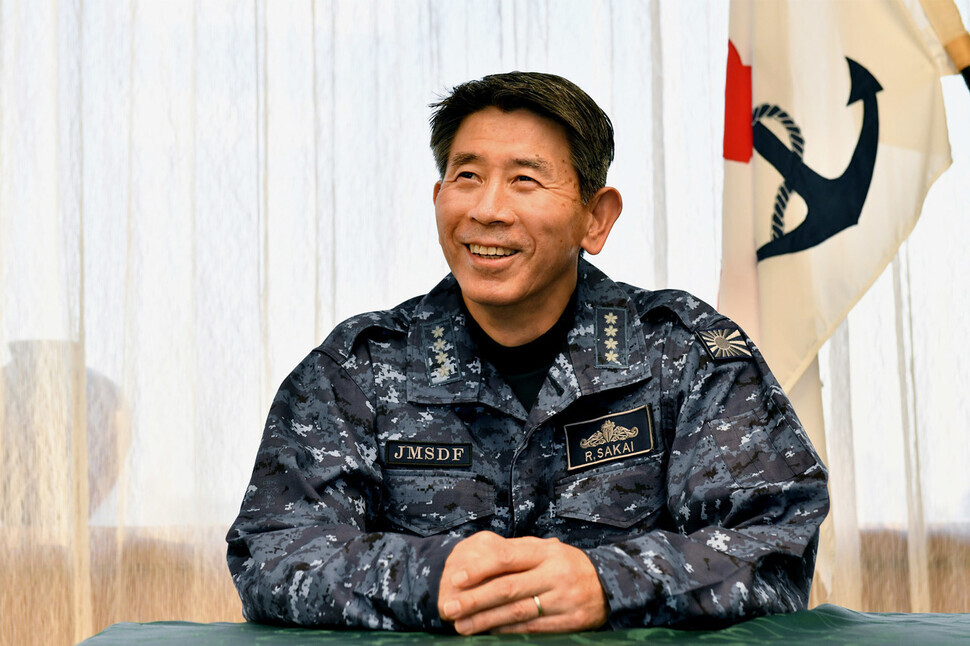hankyoreh
Links to other country sites 다른 나라 사이트 링크
“Ball is in Korea’s court”: Japanese naval chief says it’s time to improve ties with Korea

The chief of staff of the Japan Maritime Self-Defense Force (JMSDF) said the time has come to improve relations with the South Korean Navy, which have been strained since late 2018, when a South Korean warship is alleged to have directed its radar at a Japanese aircraft that made a threatening flight pattern.
The announcement from Adm. Ryo Sakai came eight days after the administration of South Korean President Yoon Suk-yeol shared plans to make concessions on one of the biggest issues between the two sides: the compensation of survivors of forced labor mobilization during the Japanese occupation of Korea.
Commenting in a press conference Tuesday on the souring of relations with South Korea since the patrol aircraft incident, Sakai said, “I think the time is ripe to firmly resolve past issues and move forward toward improving relations.”
He also made reference to the severity of the East Asian security environment with the North Korean nuclear threat and China’s increased military capabilities. Describing unity with South Korea and the US as an “extremely important measure to contribute to regional security,” he added, “The current relationship between [Japan’s] Maritime Self-Defense Force and the South Korean Navy should not be allowed to get in the way of stronger unity among the three countries.”
The South Korean Navy and JMSDF have cut off interactions since relations soured over the patrol aircraft incident in December 2018 and subsequent raising of a “rising sun” flag — a symbol of Japanese imperialism — on a Japanese warship.
For the bilateral (with Japan) and trilateral (with Japan and the US) security cooperation that the Yoon administration is pursuing, the most important collaboration is between naval forces rather than armies or air forces.
In their statement delivered in Phnom Penh last November, the leaders on the three sides said they “intend to share DPRK missile warning data in real time to improve each country’s ability to detect and assess the threat posed by incoming missiles.” This would entail cooperation and sharing of information between South Korean and Japanese Aegis-equipped warships, which have the ability to detect ballistic missiles.
But it remains to be seen whether they can paper over their differences and mend ties.
In his remarks Tuesday, Sakai said there would be “no muddying the waters” on the issue, while last month he said that the “ball is in South Korea’s court.”
This suggests the possibility that South Korean naval officials may have to express “regrets” to Japan before they can achieve the kind of bilateral cooperation the Yoon administration wants.
By Gil Yun-hyung, staff reporter
Please direct questions or comments to [english@hani.co.kr]

Editorial・opinion
![[Column] The state is back — but is it in business? [Column] The state is back — but is it in business?](https://flexible.img.hani.co.kr/flexible/normal/500/300/imgdb/original/2024/0506/8217149564092725.jpg) [Column] The state is back — but is it in business?
[Column] The state is back — but is it in business?![[Column] Life on our Trisolaris [Column] Life on our Trisolaris](https://flexible.img.hani.co.kr/flexible/normal/500/300/imgdb/original/2024/0505/4817148682278544.jpg) [Column] Life on our Trisolaris
[Column] Life on our Trisolaris- [Editorial] Penalties for airing allegations against Korea’s first lady endanger free press
- [Editorial] Yoon must halt procurement of SM-3 interceptor missiles
- [Guest essay] Maybe Korea’s rapid population decline is an opportunity, not a crisis
- [Column] Can Yoon steer diplomacy with Russia, China back on track?
- [Column] Season 2 of special prosecutor probe may be coming to Korea soon
- [Column] Park Geun-hye déjà vu in Yoon Suk-yeol
- [Editorial] New weight of N. Korea’s nuclear threats makes dialogue all the more urgent
- [Guest essay] The real reason Korea’s new right wants to dub Rhee a founding father
Most viewed articles
- 1[Column] Why Korea’s hard right is fated to lose
- 2Amid US-China clash, Korea must remember its failures in the 19th century, advises scholar
- 3[Column] The state is back — but is it in business?
- 4[Column] Life on our Trisolaris
- 5[Guest essay] Maybe Korea’s rapid population decline is an opportunity, not a crisis
- 6AI is catching up with humans at a ‘shocking’ rate
- 7[Column] Can Yoon steer diplomacy with Russia, China back on track?
- 860% of young Koreans see no need to have kids after marriage
- 9[Editorial] Yoon must halt procurement of SM-3 interceptor missiles
- 10OECD upgrades Korea’s growth forecast from 2.2% to 2.6%